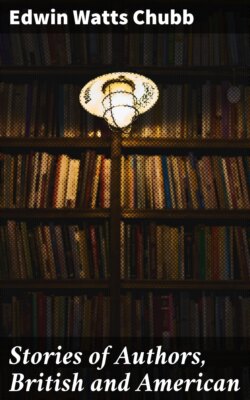Читать книгу Stories of Authors, British and American - Edwin Watts Chubb - Страница 11
На сайте Литреса книга снята с продажи.
ABOUT SHAKSPERE
ОглавлениеWhat would we not give to be able to relate a half-dozen good anecdotes about Shakspere? It is true there are traditions, the best known of which is the story that he poached deer in the park of Sir Thomas Lucy. Men have discussed the pros and cons of this deer-stealing tradition with a gravity and fulness worthy of a weightier cause. Suppose he did engage in the exciting sport of worrying a nobleman who had a game preserve. Does that fact blacken the youth's character? It is said the students at Oxford were the most notorious poachers in the kingdom, although expulsion was the penalty. Dr. Forman relates how a student who afterwards became a bishop was more given to poaching than to study.
What do we know about the life of Shakspere? We know that he was born at Stratford-on-Avon in 1564, that he died there in 1616, April 23. Some years ago I stood in the house which is reputed to be the place of his birth; over 20,000 pilgrims from all lands each year pay their shilling for the privilege of going through that house; the town corporation has purchased the property and controls it; the place has been photographed until the reading world is familiar with the picture—and yet we do not positively know that Shakspere was born in that house. For Shakspere's father owned two houses at the time of the son's birth; in which of the two he lived at this time we can but guess. We suppose he lived in the Henley Street house, for it was the better of the two houses and the Shakspere family was prospering when William was born. The house itself has been remodeled. I think it is Sidney Lee who says that the only thing that remains as it was in Shakspere's time is the cellar. We do not know the day of Shakspere's birth. In Holy Trinity Church one may look into the book containing the baptismal record of the babe, William. He was baptized on April 26 and as children were usually baptized three days after their birth we infer he was born April 23. We know that he married Anne Hathaway, a woman eight years his senior; that in early manhood he went to London; that he became an actor, dramatist, manager of a theater; that in 1597 he bought New Place, the stateliest residence in Stratford; that he lived in Stratford during the last years of his life as a highly esteemed and worthy man, and that he died in 1616 and was buried in Trinity Church. These are the facts in the records of Shakspere's life. They, however, are not the important facts. The main fact in his life is his work, the matchless collection of literary masterpieces that bear the imprint of his genius. It is also well to keep in mind that our paucity of definite documentary records is not characteristic of Shakspere alone. We may know little of Shakspere, but we know less of Marlowe, his most brilliant competitor.
It is because we know so little of fact in the life of Shakspere that we delight to let fancy paint its charming pictures. We are led into the old Grammar School which Shakspere in all probability attended. Tradition points out the desk at which he used to sit. We can infer what he studied. The name of the Latin grammar then used we can deduce from his quoting a Latin sentence just as it was misquoted in Lilly's grammar. Artists have painted from imagination the picture of the boy Shakspere. Poets have wandered over the Warwickshire region and in their mind's eye have seen the youthful bard as he walked over the same picturesque region. In Midsummer-Night's Dream we read
